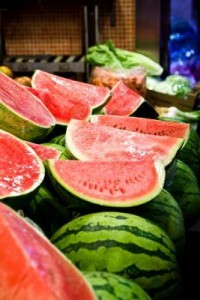Watermelon Seed Benefits
 Rachel Nelson began writing in 2003. She is a managing editor for custom health publications, including physician journals. She has written for The Associated Press and “Charleston,” “Chatter” and “Reach” magazines. She enjoys writing beauty and health articles, particularly those that focus on skin care. She is pursuing a Master of Arts in public administration from the University of Tennessee.
Rachel Nelson began writing in 2003. She is a managing editor for custom health publications, including physician journals. She has written for The Associated Press and “Charleston,” “Chatter” and “Reach” magazines. She enjoys writing beauty and health articles, particularly those that focus on skin care. She is pursuing a Master of Arts in public administration from the University of Tennessee.
Photo Credit Jupiterimages/Photos.com/Getty Images
Watermelon is a crisp summery fruit that is a staple at barbecues and picnics. Yet, there’s one aspect of watermelon you may be ignoring — the watermelon seeds. Watermelon seeds have nutritional value and can be made into a tasty treat for you and your family. However, you must chew the watermelon seeds for them to be effective — simply swallowing the seeds will not offer you the same nutritional benefits.
High in Zinc
Zinc is a mineral required to maintain healthy body functioning, particularly for your immune system. If you do not get enough zinc in your daily diet, you may observe symptoms such as hair loss, diarrhea and an impaired immune system. Adults should consume about 15 mg of zinc per day. A 100-gram serving contains 10 mg of zinc per serving while each ounce contains 3 mg of zinc.
Protein Source
Protein consists of essential and non-essential amino acids. These amino acids are the building blocks of many of your body’s functions, including making new muscle fibers and giving you long-term energy. Several types of amino acids exist, including those termed essential and non-essential — watermelon seeds contain both. Watermelon seeds are an estimated 35 percent protein, making them a good source for your body. It is important to note, however, that an ounce of dried watermelon seeds contain 158 calories and 13 grams of fat — meaning they can be a higher-fat source of protein because watermelon seeds also are made up of oil.
High in Iron
Your body requires iron to produce red blood cells. Watermelon seeds contain 2 g of iron per 1 oz. serving. Other sources of iron include oysters, beef, turkey, chicken, tuna and pork. If you are between the ages of 19 and 50 years old, you should consume about 8 mg of iron per day. Because iron deficiency can result in anemia, which leaves you feeling weak and fatigued, it is important to consume enough iron on a daily basis via sources that include watermelon seeds.
This post has already been read 833 times!








Post Comment